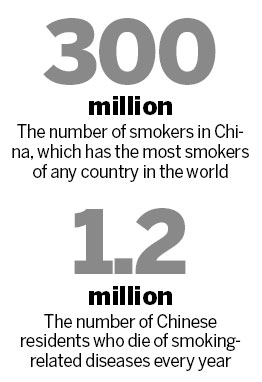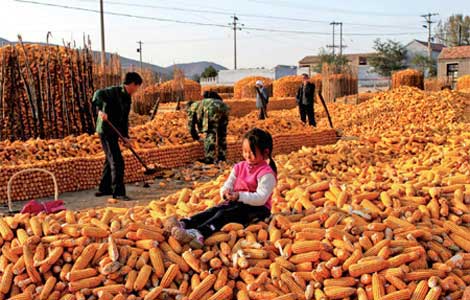Society
Smoking warnings to change
Updated: 2011-08-11 07:44
By Zhou Wenting (China Daily)
BEIJING - Next year will bring a doubling in the size of the words that appear on cigarette packages to warn consumers of the dangers of smoking.
Starting in April 2012, cigarettes produced and sold in China will bear a new warning label containing letters that will be no less than 4 millimeters in height. That will be twice the size of the current minimum, which stipulates that the letters be at least 2 mm from bottom to top, according to a notice written by the China National Tobacco Corp and published on the State Tobacco Monopoly Administration's website.
Despite the intentions, many tobacco-control experts said the step is "minor" and that it fails to deal with the chief issue.
|
 |
"There is no use in making the font size even 100 times bigger if the warning is pointless," said Wu Yiqun, deputy director of the ThinkTank Research Center for Health Development, a Beijing-based non-governmental organization that advocates for the adoption of stronger smoking-control measures.
Both Wu and Yang Gonghuan, director of the tobacco control office of the Chinese Center for Disease Control and Prevention, said the warning that now appears on cigarette packs is too weak. It says: "Smoking is harmful to your health. Quitting early is good for your health."
"The package should inform consumers of the dangers of smoking in accordance with requirements adopted by the World Health Organization Framework Convention on Tobacco Control. (It should say that) smoking causes lung cancer, coronary disease and makes people grow old," Yang said.
China decided in 2005 to ratify the convention, which also requires that tobacco warnings cover a third of the surface of cigarette packs.
"Even if the size of the words is doubled, it still doesn't meet those standards," Yang said. "The Chinese practice is to draw a line to demarcate a third of a cigarette package, where the warning should be, but the words put on it are still very small."
Experts said graphic health warnings could be printed on cigarette packs and used as a "scientific, direct and shocking" deterrent to smoking.Throughout the world, more than 1 billion people in 19 countries live under laws that require the packaging of various types of tobacco products to bear large, graphic health warnings. They often show pictures of black lungs and festering mouth sores, according to the World Health Organization.
China, though, is excluded from those rules.
Both Wu and Yang said the fundamental barrier to better control of tobacco use in the country is the fact that the China National Tobacco Corp, the country's largest cigarette-maker, is a subsidiary of the State Tobacco Monopoly Administration, China's tobacco regulatory body.
Wu said the tobacco control office has conducted surveys in recent years in which 90 percent of the respondents said graphic warnings would help them come to the grips with the thought that they should quit smoking."But the national tobacco administrator also sells cigarettes and wouldn't do something that would harm its sales," Wu said.
Both Wu and Yang said the Ministry of Health should take a lead in the campaign against smoking and the government should place more of a priority on protecting people's health than on economic interests.
"On the cigarette packaging of more than 40 countries, there are government warning that say things like '85 percent of lung cancer victims smoked'," Wu said.
China, home to more than 300 million smokers, contains the largest population of smokers in the world. Official statistics show that 1.2 million Chinese residents die of smoking-related diseases every year.
E-paper

My Chinese Valentine
Local businesses are cashing in on a traditional love story involving a cow herder and a goddess
Outdoor success
Lifting the veil
Allure of mystery
Specials

Star journalist leaves legacy
Li Xing, China Daily's assistant editor-in-chief and veteran columnist, died of a cerebral hemorrhage on Aug 7 in Washington DC, US.

Sowing the seeds of doubt
The presence in China of multinationals such as Monsanto and Pioneer is sparking controversy

Lifting the veil
Beijing's Palace Museum, also known as the Forbidden City, is steeped in history, dreams and tears, which are perfectly reflected in design.
